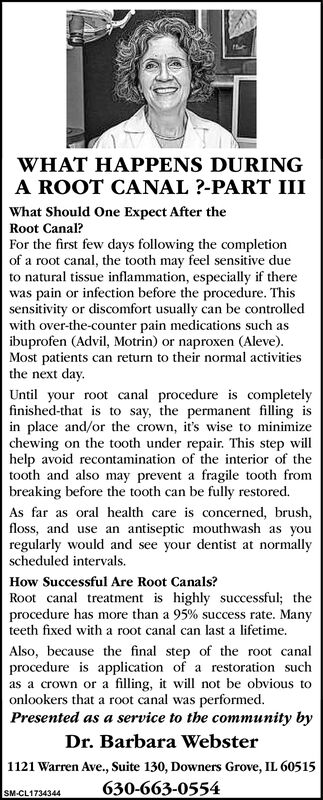Advertisement

-
Published Date
January 23, 2020This ad was originally published on this date and may contain an offer that is no longer valid. To learn more about this business and its most recent offers, click here.
Ad Text
WHAT HAPPENS DURING A ROOT CANAL ?-PART III What Should One Expect After the Root Canal? For the first few days following the completion of a root canal, the tooth may feel sensitive due to natural tissue inflammation, especially if there was pain or infection before the procedure. This sensitivity or discomfort usually can be controlled with over-the-counter pain medications such as ibuprofen (Advil, Motrin) or naproxen (Aleve). Most patients can return to their normal activities the next day. Until your root canal procedure is completely finished-that is to say, the permanent filling is in place and/or the crown, it's wise to minimize chewing on the tooth under repair. This step will help avoid recontamination of the interior of the tooth and also may prevent a fragile tooth from breaking before the tooth can be fully restored. As far as oral health care is concerned, brush, floss, and use an antiseptic mouthwash as you regularly would and see your dentist at normally scheduled intervals. How Successful Are Root Canals? Root canal treatment is highly successful; the procedure has more than a 95% success rate. Many teeth fixed with a root canal can last a lifetime. Also, because the final step of the root canal procedure is application of a restoration such as a crown or a filling, it will not be obvious to onlookers that a root canal was performed. Presented as a service to the community by Dr. Barbara Webster 1121 Warren Ave., Suite 130, Downers Grove, IL 60515 630-663-0554 SM-CL1734344 WHAT HAPPENS DURING A ROOT CANAL ?-PART III What Should One Expect After the Root Canal? For the first few days following the completion of a root canal, the tooth may feel sensitive due to natural tissue inflammation, especially if there was pain or infection before the procedure. This sensitivity or discomfort usually can be controlled with over-the-counter pain medications such as ibuprofen (Advil, Motrin) or naproxen (Aleve). Most patients can return to their normal activities the next day. Until your root canal procedure is completely finished-that is to say, the permanent filling is in place and/or the crown, it's wise to minimize chewing on the tooth under repair. This step will help avoid recontamination of the interior of the tooth and also may prevent a fragile tooth from breaking before the tooth can be fully restored. As far as oral health care is concerned, brush, floss, and use an antiseptic mouthwash as you regularly would and see your dentist at normally scheduled intervals. How Successful Are Root Canals? Root canal treatment is highly successful; the procedure has more than a 95% success rate. Many teeth fixed with a root canal can last a lifetime. Also, because the final step of the root canal procedure is application of a restoration such as a crown or a filling, it will not be obvious to onlookers that a root canal was performed. Presented as a service to the community by Dr. Barbara Webster 1121 Warren Ave., Suite 130, Downers Grove, IL 60515 630-663-0554 SM-CL1734344
